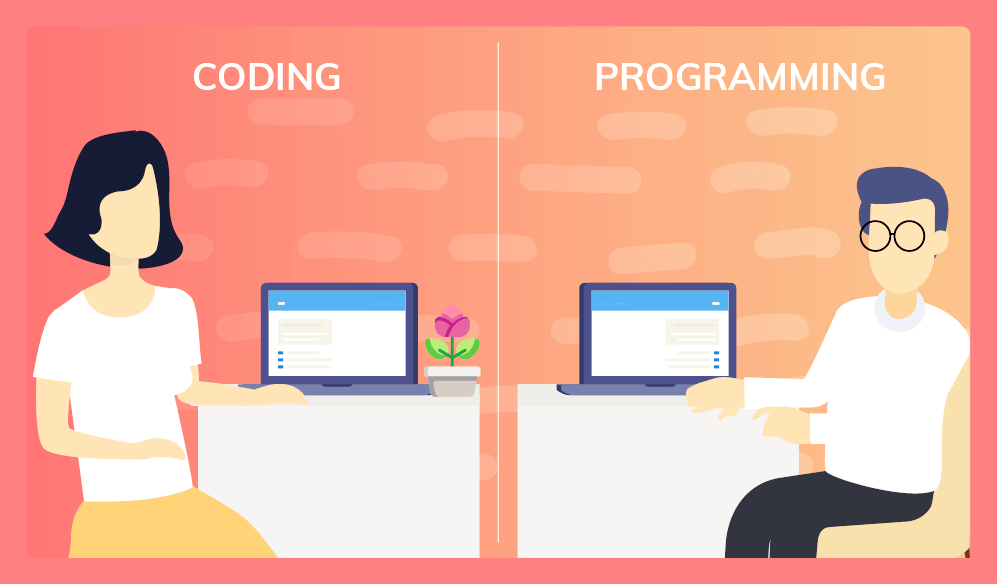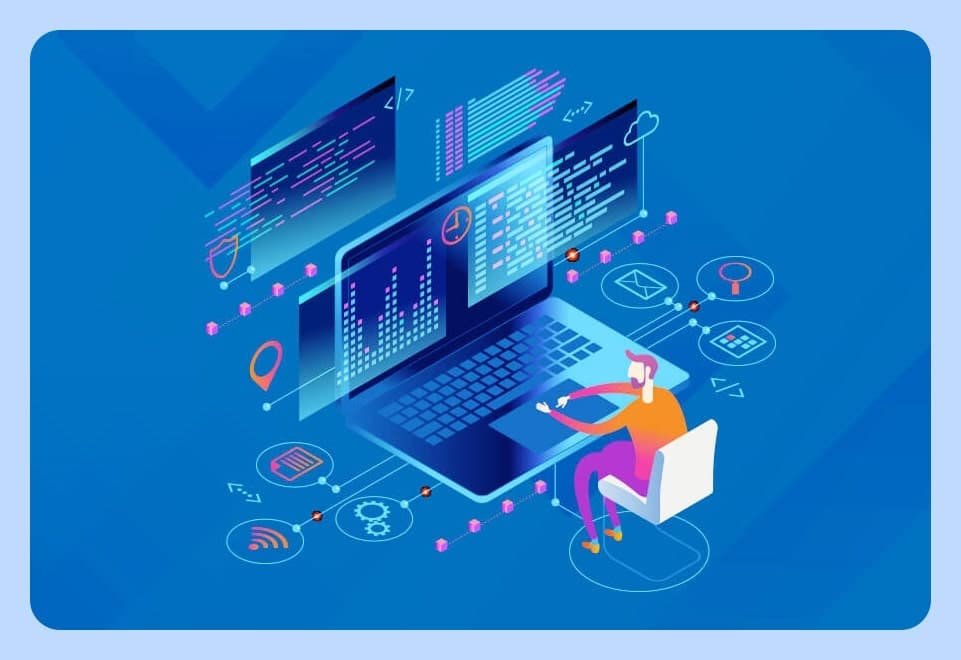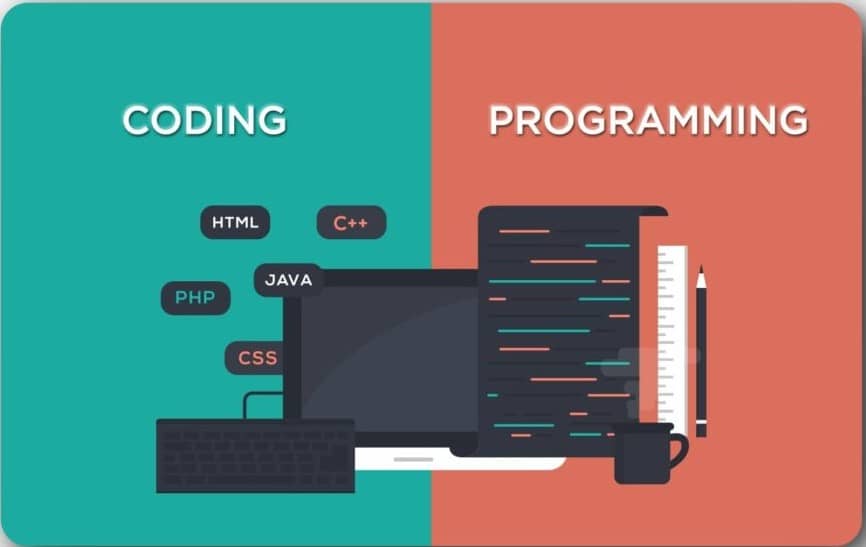When you’re not in the technology field, you are unaware of the debate between coding and programming. On the other hand, the two terms, are synonymous. We’ll discuss the distinctions between coding and programming in detail in this article so you can tell them apart. Therefore, let us examine both terms and their application in the world of software development.
Table of Contents
What’s the Real Deal Between Coding and Programming?
- Coding is akin to reading a manual on a computer.
- A programmer or developer creates instructions that detail the data and procedures necessary to create a visual or complete a task. Although computers rapidly scan lengthy coding manuals yet perform the functions required to develop and maintain a successful website or application. You can display an image or a section of the text, change the font style, open an email, and more.
- Websites, apps, and other computer-based technologies are created using programming languages.
- Computers display the words and images that a computer programmer or developer tells them to show to the general public.
- Coding instructs a machine on how to perform tasks and take appropriate actions. Each programming language enables accurate human-machine communication.
- Contrary to popular belief, one who works with computers is referred to as a computer programmer.
- Writing code isn’t the only thing a programmer does. It is also the job of a programmer to write code that machines can understand.

Consider the following distinctions between Coding and Programming, these two subjects to gain a better understanding:
| Specifications | Coding | Programming |
| 1. Differences in its process | Coding is translating a human-readable language to machine-readable binary commands. | Programming is the process of generating a software program that follows established standards and performs a particular task. |
| 2. Scope of Use | The purpose of coding is to convert requirement logic to machine-readable code. | Programming necessitates the analysis and conceptualization of various aspects of a program and the resolution of any resulting problems. All process stages are critical: debugging, compilation, testing, and implementation. |
| 3. Useful equipment | Coding does not necessitate the use of numerous software applications. You don’t need anything more complicated than WordPad or Notepad to write. | Programmer’s tools require additional document analysis and coding tools. Also, code generators, databases, testing frameworks, compilers and linkers are among the tools that can be used to debug code. Because of the language’s flexibility, developers should be familiar with advanced concepts like Git and Github, database tools, analytics tools like Apache Spark, presentation tools, and cloud tools. |
| 4. Competence and expertise | The coder’s job is to write code that follows the programmer’s technical specifications and ensures that the final product meets those requirements. | Programmers must understand the fundamentals of programming languages. Apart from this, programming requires data structures and algorithms. Also, complex programs require a specialized degree and years of experience. Besides, he uses both his creative and analytical skills to solve problems. For this reason, it must also decipher and create complex data structures and algorithms |
| 5. The final product | They accomplish this by writing computer code in a variety of dialects. | However, programming produces a fully functional application, software product, or website due to their efforts. |
What Are the Advantages of Coding?
Software developers use programming languages to develop websites and applications. In addition, front-end developers frequently write HTML, CSS, or JavaScript code. Below are the advantages of coding:

Coding Can Assist You in More Effectively Comprehending Technical Concepts.
Technology permeates every aspect of life and advances at a breakneck pace in today’s world. Coding is already a critical component of this technological evolution, and it will become even more so as new robotics and automated technologies are developed. On the other hand, coding websites will equip you with the skills necessary to continue shaping the future.
So, this could include roles in robotic process automation, creating mechanical systems for multinational banks or healthcare organizations, or even assisting in developing self-driving car technology – and that’s just scratching the surface!
It Can be Beneficial in Resolving Issues.
Coding can also assist you in developing your logical reasoning abilities by allowing you to view problems in novel ways. Thus, you need to break down a large coding project into smaller, more manageable tasks to overcome any obstacle. Moreover, personal or professional use is possible for this multipurpose tool, even for personal and professional purposes.
Coding Can Assist in Visualizing Data.
It aids in the development of your data analysis and visualization abilities. Also, these skills are advantageous when developing complex data dashboards and reports, which are critical for increasing data accessibility and comprehension. Additionally, coding is a transferable skill that can be used in a wide variety of data-related roles outside the technology industry.
- Consider marketing: you can apply the data skills gained through coding to decipher performance data or customer trends and then use that information to inform your marketing strategy.
Coding and Other Forms of Creativity Can be Combined.
Additionally, learning to code lets you showcase your artistic abilities on the web. For example, you could use your coding skills to create online blogs or complex websites. Instead of utilizing pre-made templates, you should develop your own. However, as an aspiring business owner, this can be an excellent way to help you stand out when creating an online portfolio or visual identity for your brand.
After all, coding can lead to various creative jobs, such as graphic design, web development, and application development. There are numerous choices.
Coding is a Language that Everyone Understands.
Although language barriers can be a significant barrier when changing jobs or relocating to a new country. On the other hand, coding is the ubiquitous nature of coding languages, and they are usable in any country.
Coders Constitute a Distinct Subgroup of the Population.
Joining a programming or coding community as a coding enthusiast has several advantages. In addition, it’s a chance to share knowledge, advice, and abilities with others who share your interests. Besides, FDM hosts hackathons regularly for our consultants to collaborate and code collaboratively.
Coding Enables Career Advancement.
Coding is a highly sought-after skill in various industries, and it can lead to lucrative careers in robotic process automation, software development, and technical operations. Additionally, computer programming offers numerous opportunities for advancement into management and senior positions and the opportunity to learn and expand your skillset while employed.
What Are the Most Widely Used Programming Languages?
Python
Coding and Programming: The next generation’s most popular programming language is Python. 80 per cent of developers, according to a recent survey, primarily program in Python. Moreover, python’s extensive libraries make artificial intelligence, data science, and machine learning processes easier to understand and implement. As a result, learning this programming language now will ensure your success and advancement in 2023.

These are the incredible features such as the following:
- It is simple to program and learn.
- Python dialects such as CPython and Jython and other Java and C dialects were included.
- Sustaining support for graphical user interfaces (GUIs)
- Intel, Facebook, Spotify, and Netflix are just a few companies that use Python.
Java
Desktop, mobile, web, artificial intelligence, and cloud applications use this technology. As a result, mastering and teaching this technology can result in excessive compensation, incredible career advancement opportunities, and global recognition. The following are some of Java’s most distinctive features:

- Platform independence and object-oriented programming have enhanced productivity, performance, and security.
- It is the safest language in the world.
- Amazon, Adobe, Flipkart, and Instagram are all companies that use Java.
As a result, Java will be a critical language to master in 2022.
JavaScript
According to the survey, over 97% of websites employ JavaScript on the client side of the webpage.

- Its well-organized codebase increases productivity and makes it easier to read.
- It is prevalent and is a simple language to pick up.
- Control over the browser is enhanced, and the application is platform-independent.
- Validate the accuracy of the user’s input.
- Microsoft, Uber, PayPal, Google, and Walmart are just a few companies that utilize JavaScript.
According to recent data, JavaScript developers are required by 72 per cent of businesses. Such as an outcome, JavaScript in 2022 might be the perfect career action you ever make.
Kotlin
Kotlin is a cross-platform programming language primarily used to develop mobile applications. Over 60% of Android developers make use of it. According to several reputable indices, Kotlin is the fourth-fastest-growing programming language. In addition, numerous characteristics set Kotlin apart, including the following:
- Structured concurrency and condensed code.
- Adding additional security features.
- There is approximately 20% less coding in Python than in Java.
- It is entirely compatible with other operating systems.
C/C++
It’s more verbose than Python, and beginners will often find themselves writing additional code to accomplish the same tasks. It is necessary for comprehending abstract concepts. Besides, learning C will provide you with skills to transfer to other, more concise programming languages.

C++ is the programming language’s successor to C. Besides, the syntax of C++ is similar to that of C, Still, it includes objects, a powerful variable type that simplifies the development of complex applications. However, I recommend beginning with C because it introduces fewer concepts transferable to C++.
CSS/HTML
HTML, or Hypertext Markup Language, is the internet’s foundation language; it is used to create web page content. Differences Between Coding and Programming.
If you’re unsure whether coding is for you, HTML is the most straightforward language to learn. However, in the conventional sense; does not support script execution and cannot create functional programs. However, because HTML is used throughout the internet, learning it is critical to understand it.
CSS, HTML’s younger sibling language, is likely unfamiliar to you. HTML controls the content that appears on a web page but not the appearance of that content. Cascading Style Sheets, or CSS, are used to resolve this issue. It also controls colour, font size, and even entire page layouts.
CSS is not a programming language in the strictest sense of the word. It’s a collection of HTML rules. I strongly advise you to learn HTML and CSS, as they are almost always used in conjunction. If this is not done, your web pages will appear dull.
HTML and CSS are simple to learn because they do not require you to think about the computational logic associated with programming languages. HTML and CSS are less abstract than other languages to understand because you can quickly see the results of your code — create an a.html file and open it in your browser. Additionally, you can open a pre-existing website and inspect the underlying code with your inspect tool. As a result, this enables you to acquire two languages that you will use daily in a single day.
Conclusion
Therefore, many people confuse coding and programming. Coding and programming are both required for the development of any software product. However, programming is concerned with creating executable programs that generate mechanical outputs in response to inputs, and it necessitates an in-depth understanding of the entire software development life cycle.
